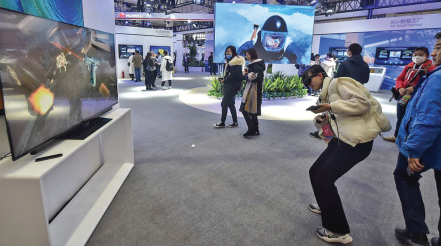5G is the coming game changer for the video gaming industry


5G internet infrastructure, such as networks pioneered in China, is big news for the world's largest entertainment industry. Video gaming and e-sports have long had a symbiotic relationship with new generations of internet connectivity; however, 5G may be the biggest catalyst yet for gamers worldwide.
Superficially at first glance, speeds almost 20 times faster than 4G will mean that larger chunks of data will be moulded into exciting creative content for consumers, faster than ever before, with near-invisible latency speeds. However, mere download speeds are not the only change afoot. Doors open into a variety of new realms for the video gaming industry, setting the foundation for the futuristic entertainment experiences of tomorrow.
One area where a lucrative market is expected to emerge from this is virtual reality gaming. An immersive concept that has been bubbling in development for several decades now, one obstacle to mainstream adoption has been the fact that VR often suffers from high latency, leading to the all-dreaded lag, sacrilege for gamers around the world.
The tendency for VR gaming to rely on wireless connections further exacerbates this issue. This has, so far, been a shame, as the potential for VR is huge, with fully immersive experiences complete with tactile feedback being an ambitious selling point for rudimentary prototypes and unpolished current offerings. Online multiplayer gaming is the crux of many large e-sport smash hits for professionals and amateurs alike, meaning that 5G could well be what this particular technology needs to finally get off the ground. In the coming years we may see the first-ever VR blockbuster hit, commanding the same household name buying power as the likes of League of Legions.
Aside from VR, 5G will also bring gaming advantages to devices you already own. Mobile gaming is a huge market, with an estimated 2.2 billion players around the world, according to TechJury. Faster internet will have a big impact on this huge subsection of the market, freeing devices from having to do much of the data load processing themselves. Huge cloud gaming platforms with hundreds, if not thousands of players, all on the same server, remotely playing wherever they are in the world, may soon become a reality. We may soon see gaming titles which take advantage of graphics-rich hypersocial mobile gaming, rivalling even the previous generation of purpose-built gaming consoles seen in the last decade.
Aiding consumer habits and discoverability are also areas where 5G can help.
With the advent of large video streaming platforms, such as iQiyi and Netflix, there is an overwhelming amount of content available. Consumers tend to focus on recommendations from friends and family in order to find trusted sources of content they then try.
Likewise, with the current gaming landscape, thousands of relevant gaming titles may pop up if one searches "shooting game "or "football game". This inundation of content means that being able to quickly download a trial version of a game and experience it before making a purchase is vital in enabling informed choice, faster. The streamlining of this process made possible by 5G is predicted to greatly shape the industry, and affect our gaming habits.
The gradual rollout of 5G will not lead to overnight changes to what is essentially an industry larger than music, television and film combined. Instead, there will be a gradual evolution of products, where it will take time for platforms to fine tune for consumers.
5G is, nevertheless, a game changer, a technical paradigm shift which will be the biggest factor in product improvements and variety over the course of the next decade. Gaming has long shaken off its stereotype of just being for lazy teenagers, and now commands a widespread demographic of avid fans. Given the diversity of innovation incoming, it is vital that consumers are aware of this coming change, and are willing to try out and take advantage of new offerings to find out what works for them.
Barry He is a London-based columnist for China Daily.

































